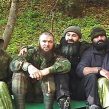
Kadyrov Claims Umarov Gravely Wounded, Accuses U.S. of Subversion
Publication: Eurasia Daily Monitor Volume: 6 Issue: 112

Chechen President Ramzan Kadyrov claimed on June 10 that the leader of the armed Islamic separatist movement in the North Caucasus, Dokka Umarov, was wounded earlier this month during a special operation conducted along the Chechen-Ingush administrative border. "It can be said with a large share of probability that Dokka Umarov, the chief terrorist, was badly wounded," Kavkazky Uzel quoted Kadyrov as saying. However, Kadyrov would not confirm earlier reports that Umarov had been killed, saying such reports need to be checked carefully (Kavkazky Uzel, June 10).
Russian media reported on June 8 that Umarov had been killed. Interfax quoted a "source in Russia’s power structures" as saying that an operation to eliminate Umarov had been successfully carried out in one of the republics of the North Caucasus. Itar-Tass reported that Umarov had been killed near the village of Muzhichi, located in Ingushetia’s Sunzha district near the Chechen-Ingush administrative border, and quoted an unidentified source as suggesting Umarov’s body was among several charred corpses found in a car that had been hit by some kind of artillery fire. The source said Umarov had been seriously wounded the previous week during a special operation near the village of Dattykh, during which his bodyguard was killed. Interfax, it should be noted quoted an unnamed Chechen law-enforcement official on June 8 as saying he had no information either confirming or denying that Umarov had been killed (Interfax, ITAR-TASS, June 8).
Adam Delimkhanov, the State Duma deputy and close Kadyrov associate who is wanted in the United Arab Emirates on charges of organizing the assassination of former Vostok battalion commander Sulim Yamadaev in Dubai, told Kadyrov on June 4 that Umarov may have been wounded during a special operation along the Chechen-Ingush administrative border (www.newsru.com, June 4). Ingushetia’s President Yunus-Bek Yevkurov, for his part, claimed on June 9 that a "mercenary" from Azerbaijan who was Umarov’s bodyguard had been killed near the village of Nizhny Alkun in Ingushetia, but that it could not be confirmed that Umarov had also been killed (Kavkazky Uzel, June 9).
Some independent observers have not ruled that Umarov was killed. Aslambek Apaev, a North Caucasus expert with the Moscow Helsinki Group, said he still doubted the reports that the Chechen rebel leader had been killed, but added that if they were true, then the authorities were waiting to announce his death until the June 12 Russia Day holiday, which commemorates the day in 1990 that Russia’s parliament formally declared its sovereignty (Kavkazky Uzel, June 9).
The Kavkaz-Center website, which is the mouthpiece for the armed Islamist wing of the North Caucasus rebel movement, has denied reports that Umarov was killed or wounded. The website said in a June 9 posting that reports stating that the "emir" Dokka Umarov – "emir" is the title the Islamist rebels have given Umarov in his role as leader of the so-called Caucasus Emirate – "do not correspond to reality." The website said the reports of Umarov’s wounding or death had been leaked to "weaken the effect" of the news of Dagestani Interior Minister Adilgerei Magomedtagirov’s June 5 assassination, adding that such leaks were typical of "informational active measures" employed by Russia’s special services. The website noted – as did some independent observers – that Russian authorities have prematurely declared Umarov dead several time before (www.kavkazcenter.com, June 9).
Ramzan Kadyrov, meanwhile, launched his latest attack on the United States, accusing it of fomenting conflict and tension in the North Caucasus. "I like to call things by their right names," he said in an interview posted on the Chechen president’s website. "And it is precisely from the side of America that work is being carried out aimed at the disintegration of the sovereign Russian state. It is not terrorists, not Islamists. There is not even a whiff of Islam there [in America]. They invented this system. They are creating problems for Russia; they want to pull Russia down. That did not work through Chechnya, [so] now they want to do it through Abkhazia, South Ossetia, Dagestan, Ingushetia. They have such a system working – all sorts of social organizations created to spread rumors and gossip, to agitate people; they know that that in the Caucasus the only way to create problems for Russia is on a religious basis."
Kadyrov added in the interview that "they" – meaning the United States – are using "powerful specialists," claiming that certain "Arabs" active in the North Caucasus (he cited the names "Yasser" and "Makhdan") have already been in the region for 14 years. "The speak Russian better than I do but do not utter a single word in Chechen," Kadyrov said. "They have excellent training. They do not take part in fighting; they are special services workers, they are provided for, guarded and financed; they have been sent to Russia to conduct subversive activities."
Such "agents," Kadyrov added, are working to ensure that there is no order in Russia. "And the Chechen people understood that, and all the peoples of Russia need to understand that," he said. "The countries of the CIS also must understand that striving for and orienting toward the West will lead to no good. They must live with and be friends with Russia. In any case, they will reach that same conclusion at the end of the day. Russia is a mighty and great power, and it will never be possible to pull it down" (www.chechnya.gov.ru, June 10).
Last September, Kadyrov accused the United States of fomenting unrest in the Caucasus and encouraging Georgia to attack South Ossetia.




